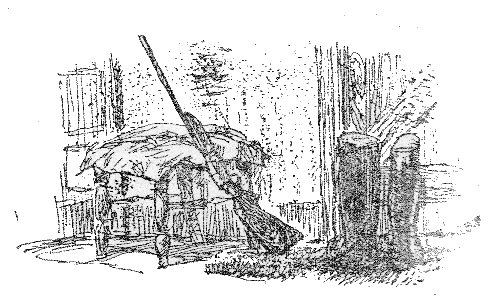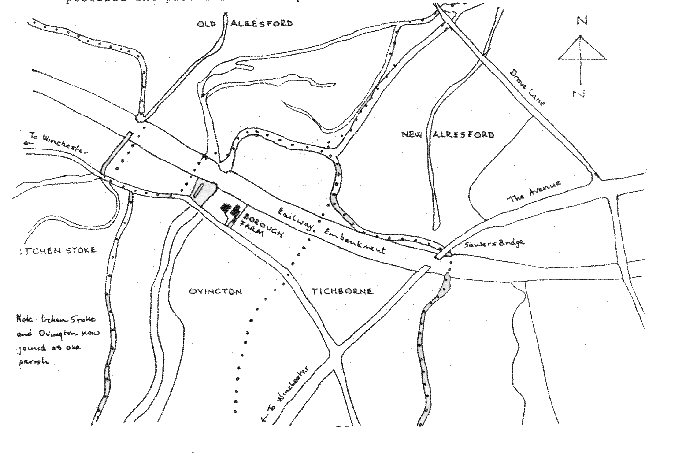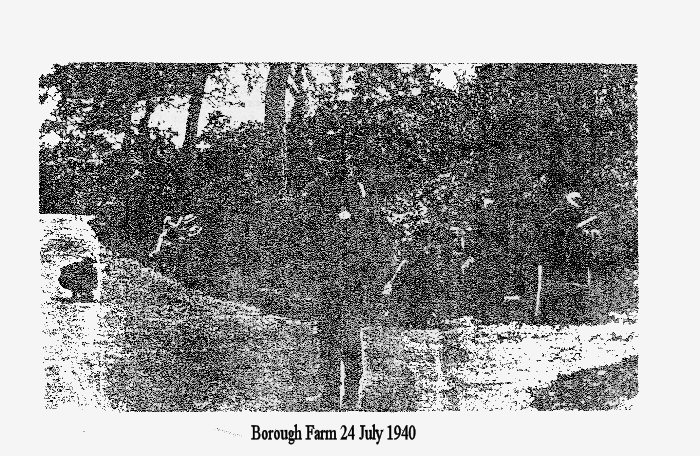NO 74 THE SIEGE AT BOROUGH FARM
by Jane Underwood
'of what avail the plough or soil on land,
or life if freedom fail'
Ralph Waldo Emerson

The site of Borough Farm is situate at the extreme northern tip of the long and narrow Ovington parish, where it is surrounded by the adjoining parishes of Itchen Stoke, Old Alresford, New Alresford and Tichborne. This area is part of the ancient wet lands associated with the meeting of the Candover Stream, the river Alre and the river Itchen, The high embankment and its railroad which physically severs the extreme tip of land from its parish of Ovington was constructed by the Winchester to Alton railway in the mid 1860s.
The dwelling, known as Borough Farm, is a late Georgian house believed to have been built by the Tichborne baronet, as a hunting lodge, being situated on the north side of the roadway leading on to Itchen Stoke and Winchester; its lands then stretched between the waters on three sides and Tichborne parish boundary on the west.
It is recorded that in 1731 a Widow Thorne was presented because her rails at Burrow Gate needed repairing. This gate presumably was across the road in the vicinity of the Candover stream which separates the land in Itchen Stoke from the land belonging to Burrow Farm, in the parish of Ovington. Burrow is now spelt Borough. A further reference is given in the Ovington Tithe Award of 1846, when Borough Farm was held by Mrs. Eleanor Smith in tenure of Sir Doughty. Outbuildings had by then been added to the house, together with about four acres of adjoining land. Of the main farm lands some were situate on the southern side of the roadway, but the greater part were half a mile away - on the shoulder of the downs - making a total of thirty to forty acres. Mostly arable land, the farm included two fields of two acres each (i.e. four acres) of pasture land. It is suggested that this farm should however be considered as a typical marginal small holding rather than a farm in the true sense of the word. The farm was still held by Mrs. Eleanor Smith now described as 'a farmer' in the year 1880.
By the mid 1880s Mrs. Frances Ellen Walden moved into Borough Farm with her two children, being also described as 'Mrs. George Walden farmer'. Her son, George Raymond Walden. was then a young man, George Walden, the father of George Raymond Walden, had been recently buried in the parish churchyard at St. Peters Church at Ovington, leaving Mrs. Walden to run the farm. She died in the year 1902 and was buried in her husband's grave, thus leaving their son George Raymond to inherit the farm. He was then about thirty years of age; he never married, but continued the farming business on his own.
Well known in the locality, George Raymond Walden was remembered by his associates as a good farmer, no man could drive a straighter furrow, and well known as a keeper of horses, which were often used when contract ploughing for other farmers in the neighbourhood. Friendly and competent in all his work he was basically reserved in temperament and kept very much to himself. He was also noted for his breeding of good quality pigs which many farmers in the district purchased from time to time. His mixed farming also included the care and rearing of a small herd of cattle. Raymond Walden, later in life, tended to be rather crotchety in his business deals but this in no way reflected on his reputation of quality and competence as a farmer.
Now early in the year 1940 the Second World War was raging, Germany had overrun and conquered Poland, Norway, Denmark, Holland, Luxembourg and France. Great Britain stood alone against the might and ambitions of Adolf Hitler; the U boat campaign in the North Atlantic was proving deadly effective, the numbers of ships bringing food and supplies to Britain were being sunk at such a rate as to raise the distinct possibility that the country would be starved into submission.

Winston Churchill, as First Lord and then as Prime Minister, initiated a number of measures designed to increase as rapidly as possible the production of staple foods at home. Legislation was agreed by Parliament and War Agricultural Executives were set up in each county with sweeping powers to order the cultivation of used and unused land ranging from parks and ornamental gardens to derelict farmlands. It also empowered the W.A.Es.to seize a farmers land and evict him if he was deemed not to be farming his land effectively,
On the 17th of April 1940, seven months after the outbreak of the hostilities this newly appointed Hampshire War Agricultural Executive Committee responsible for implementing the new Defence General Regulations under the powers now delegated by the Ministry of Agriculture, made a Cultivation Order in respect of the farm tenanted by Mr. George Walden at Ovington, This order directed 'that during 1940 ploughing, summer fallowing and preparing for cropping should be carried out on two areas of land at Borough Farm amounting to about four acres'. This order referred to the two small fields of two acres each, making a total of four acres, that were then used as pasturage for the horses and cattle of this mixed farm. Without the continued use of these two fields as pasturage the viability of the farm would become completely unbalanced; the horses and cattle would have to be destroyed.
Mrs. Roskilly, the sister of George Raymond Walden, had been living with him as his housekeeper since the death of her husband. She was approached by Mr. Morton, the Assistant County Land Officer in charge, for help to persuade her brother to comply with the order - but to no avail. As she could not bear to see her brother evicted, she went to stay with friends in Alresford on the night before the final notice was due to be served; thus leaving her brother alone in the farmhouse.
The Agricultural Committee's enforcement procedures continued without agreement being reached and on the 20th July their Notice of Intention to take possession of Borough Farm was issued on Mr, Walden. The Committee made arrangements for the police to accompany Mr. Morton, the Assistant County Land Officer, to serve the notice at Borough Farm on the 22nd July at 11.20 am, Mr. Walden barricaded himself in his house and prevented entry, protecting his property and livelihood with his shotgun.
The siege at Borough Farm, by the police, lasted for nearly twenty four hours. Successive attempts, using shotgun fire by both sides, were made by the police to dislodge George Walden; tear gas canisters were also thrown through the windows. On the following morning, further armed police reinforcements having arrived and being placed in strategic positions, the farmhouse was completely surrounded and entry secured. This final assault, after much gunfire, was halted when groans were heard and on entering an inner room George Walden was found unconscious on the floor. He had received a gunshot wound to his head. He was carried out and taken to Winchester Hospital; he died soon after admittance.
Locally the whole operation was hardly noticed at the time, but as the news gradually spread it caused a severe shock throughout the entire neighbourhood. The eviction of George Walden had been carried out, and possession had been gained, but George Walden was dead!
The happenings of that horrendous twenty four hours however were witnessed and covered by the national press and their reports and photographs, detailing the action taken by the Agricultural Committee were published in the national newspapers the following day.

The inquest on the death of George Raymond. Walden was held on the 3rd of August when, in accordance with the new wartime regulations, members of the public were not, permitted to attend, and all the evidence heard and considered was given, in detail, by the police and Agricultural Committee. There was no evidence or representation allowed or heard-on behalf of Mr. Walden,
Expert evidence given by the pathologist on his post mortem examination, shewed that George Walden's death had been caused by a gun shot wound to the right side of his head; there were no signs of scorching or powder marks on the wound and death was due to injury to the brain following the gunshot wound. Further evidence was given by the gunsmith, who stated that if the deceased had held his gun to his own head there would have to be signs of damage and powder shots from the type of shot used. There was no sign of such damage or markings which meant that the wound was not self inflicted, These experts had proved conclusively that George Walden did not cause his own death. The Coroner, when summing up, confirmed that this evidence entirely disposed of a suicide attempt and it was a shot fired by one of the police which had caused the fatal injury. The verdict of the coroner's enquiry was given as 'justifiable homicide on behalf of the police'. Full details of the coroner's inquiry were reported in the pages of the Hampshire Chronicle of August 1940.
But what about George Raymond Walden; Why did he have to die? The records confirm that no evidence was taken giving his reasons for not complying with the order; for the wartime regulations forbade any evidence and/or representation on his behalf. It is said that on the night before; the eviction order was brought to Borough Farm, George Walden. being a Roman Catholic, visited his priest at Tichborne. Significantly it would appear he was determined to defend his home, for it was nobler to do so than to surrender, and with his mind at ease, he died in sancto spiritu.
And did the Hampshire Agricultural Executive Committee, having got possession, succeed in obtaining the 'ploughing, summer fallowing and preparation for cropping' to be 'carried out on the two areas of land at Borough Farm amounting to about four acres' to the benefit of the British public during those dark days of the Second World War?
Over the years a number of writers have chronicled the dreadful happenings at Borough Farm on that fatal night of the 22/23 July 1940. Much apprehension still existed in the English farming communities when, after a victorious conclusion to the fighting in 1945, the newly elected British Government passed the Agricultural Act of 1947. For this new legislation contained and continued, in peace time, the same provisions and orders with possible eviction under which Mr. Walden had died. Later however, by the Agricultural Act of 1958, the powers of an Agricultural Committee to dispossess a farmer were finally repealed.
Today we can record that the old farmhouse is now a quiet rural dwelling again, with its lawns running down to the waters of the Itchen together with its excellent fishing. The array of barns and sheds still occupy the eastern part of the lands.
Legal NoteUnder 3 the strict war-time conditions of censorship and control the War Agricultural Executive Committees were empowered to seize a farmer's land and evict him if he was deemed not to be farming it efficiently. He had no means of defending himself - proceedings were held in private and the press were not admitted. The first the public knew of any happening of this nature was after the deed was done. It is not clear why Walden could not have been left in the farmhouse to rear his livestock, but it seems that the policy was never to leave the farmer in his home when his land had been taken over.
Copyright Jane Underwood & Working Party Nov 1991
Sources
Hampshire Chronicle August 1940
Daily Mirror and other papers July 1940
Ovington Tithe Award and Map 1846 - HRO
Ordnance Survey Map - Hampshire Library
Living Casualties - Farmers Rights Association
History of Itchen Stoke - Isabel Sanderson
Modern Rural Rides - George Winder 1964
Victoria County History Hampshire - HRO
SHAMEFUL HARVEST by A.G. STREET
Dedicated - To the memory of George Raymond Maiden of Itchen Stoke , Hampshire who lost his life on July 22nd 1940, while resisting eviction from his house at the order of the Hampshire County War Agricultural Executive Committee.